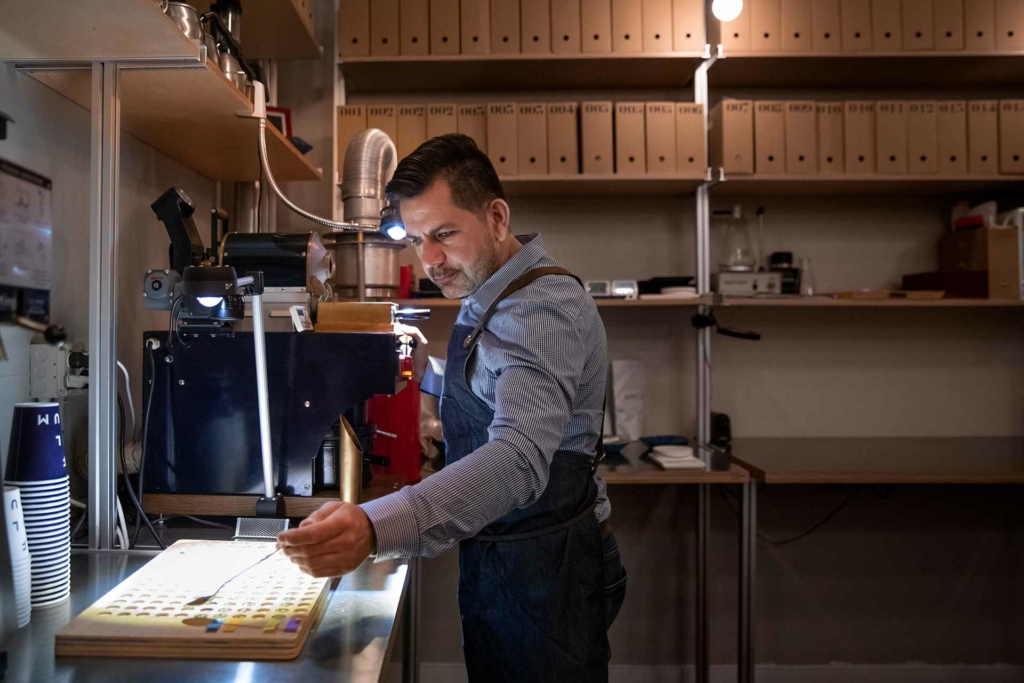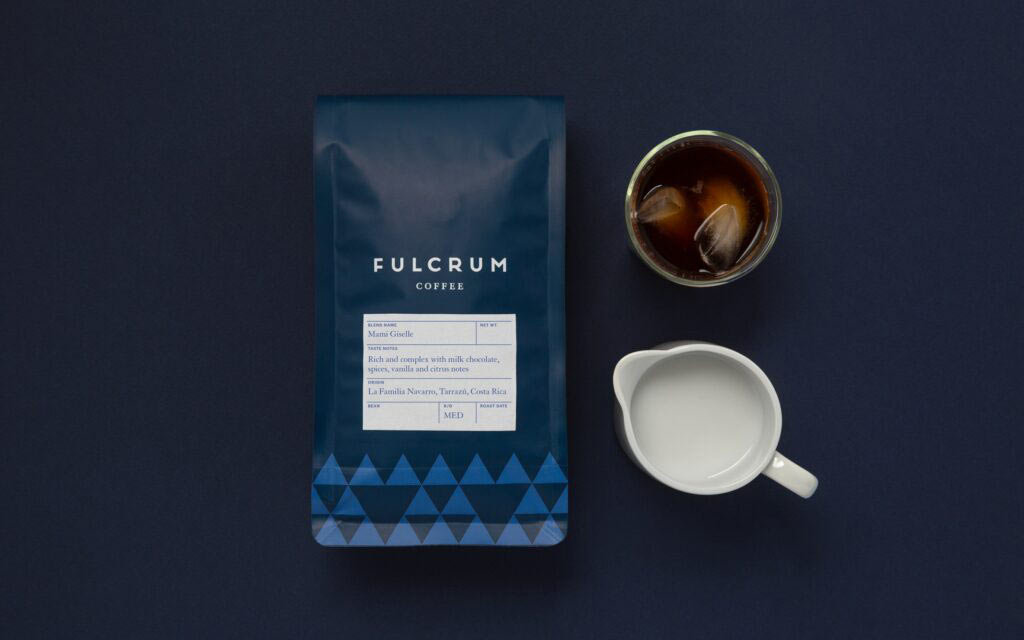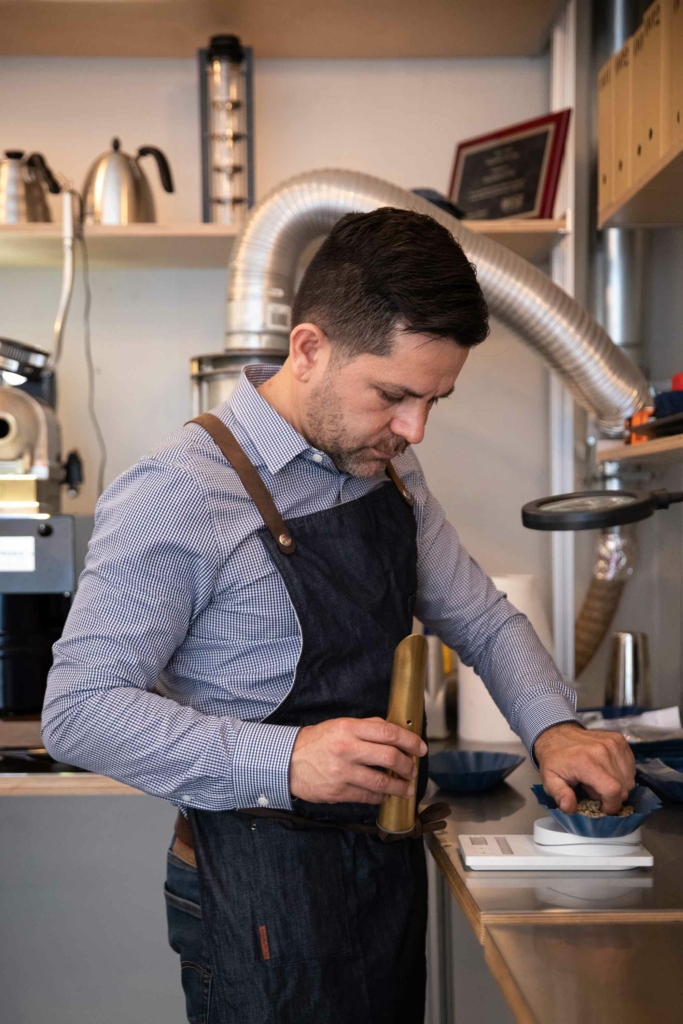
Fulcrum Coffee vice president and head roaster Blas Alfaro was around 10 years old when he roasted his first batch of coffee beans on his family’s coffee farm — just like his father, grandfather, and great-grandfather did generations before him.
For Blas — a fifth generation Costa Rican coffee farmer — coffee is a language, passion, and way to affect real, tangible change.
Lee Falck, Brian Jurus, and Blas united two iconic Seattle coffee brands, Silver Cup and Urban City, to create Fulcrum Coffee in 2012.
“We saw the necessity of creating an umbrella to unite the two brands,” Blas said.

The goal of the merge was to fuse storytelling and single-origin coffee. Urban City and Silver Cup were known for their coffee blends, so they saw an opportunity to hone in on single-origin coffee that’s unique to a country, family, or farm.
Blas worked with Lee at Silver Cup overseeing the coffee program for two decades, while Brian Jurus started Urban City about 29 years ago. Brian and Lee brought their experience in the beverage industry, and Blas brought his deep knowledge and expertise on coffee.
They came up with the name Fulcrum to represent the perfect balancing point between Urban City and Silver Cup.
Creating the Fulcrum brand allowed them to create a complex spectrum of coffee that addressed the various needs of their customers while sharing the stories of the farmers they work with.
What really makes Fulcrum special are the relationships they’ve cultivated with their farmers.
Fulcrum currently works with about 40 farmers in close to 30 countries, and Blas has maintained a personal relationship with all of them. He’s not only fluent in Spanish and can communicate with the majority of their farmers in Latin American countries, but he’s also fluent in the language of coffee.
“Even if it’s a farmer in Thailand, we speak the coffee language,” Blas said. “And when I’m talking about coffee language, I’m not talking about coffee as going to a cafe… I’m talking about the language of coffee trees, varieties of coffee, patterns on farming, ways of taking care of a tree — that’s the type of language that I understand.”
Blas was born and raised on a coffee farm in the province of Alajuela in Costa Rica that’s been in his family for over 100 years. The family farm is nestled in the Central Valley — the very first place where coffee was grown in Costa Rica in the late 18th Century. The valley is surrounded by volcanic mountain ranges and has the perfect tropical climate ideal for growing coffee.
“My mom, when I was 10 months old, she would put me on a coffee sack under a coffee tree and get one of my 10-year-old sisters to take care of me because she was picking coffee,” Blas said.
Growing up, he remembered coming home from school and helping prune the coffee trees to gather firewood for the winter. He’d pick coffee beans to save enough money to buy his own bike while his mom cooked arroz con pollo with the chickens they raised on the farm.
Blas has even kept his great-grandfather’s notebooks detailing that dates back to the 1890s. It reminds him of where his roots are.
“[I feel] a sense of pride and a sense of belonging to an industry that has created a living for so many generations in the past,” Blas said. “When I think about it, I’m the first one — going back to my dad, my grandfather, and my great grandfather — that’s no longer farming.”
Blas also said it was tough growing up knowing he was gay in his traditional Catholic household. After graduating from college, he saved enough money to buy a ticket to the U.S. to pursue a better life for himself.
“It was a hard time,” Blas said. “But I knew why I was doing it — because I knew I’m going to live an honest life, I’m going to be with someone that I love. I knew I was gay, and that I’m going to be with someone similar to me.”
He ended up moving to Texas where he met his now husband who immigrated from Nepal. The couple moved to Seattle 15 years ago where they’ve been raising their two 9-year-old daughters.
Blas’s experience growing up on his family’s farm has put him in the unique position of truly understanding the work coffee farmers go through and deal with on a daily basis.

“I’m proud about it because I bring in something that I can be doing that is unique,” Blas said. “That is being able to connect with the farmers that we buy coffee from on a different level.”
Blas said Fulcrum chooses the farmers they work with thoughtfully and intentionally. He works hard to select coffee from women-run coffee farms and with farmers who give back to their communities.
What do you do for your community? That’s the first question Blas asks when he’s talking with potential coffee farmers for Fulcrum to work with. His philosophy is that supporting farmers who give back creates a ripple effect that will help the communities the farm is in.
Fulcrum is also on a mission to create a more sustainable coffee industry.
Blas is a big advocate for hybrid coffee — a type of coffee plant that’s a cross between two species, which makes it more resilient to disease and is better for the environment. He said the same quantity of hybrid coffee plants can produce up to 40% more coffee on the same amount of land than the average coffee plant.
“About 30% of the coffee that we use in our blends are hybrid coffees,” Blas said. “That’s because we care about being sustainable, and we even have a plan to be better than that.”
Fulcrum goes beyond sustainability to make an impact with the communities they work so closely with. Blas said it’s his duty as a coffee roaster to help farmers become more resilient, including encouraging them to grow coffee varieties that are right for them and their climate. They’re even going to be involved in building a school in Nicaragua in one of the communities where they source their coffee.
“We’re not only going to be sustainable, but we’re going to be more impactful,” Blas said.
You can find Fulcrum’s coffee in plenty of places across Seattle, including The Station, Hood Famous Cafe + Bar, and Central Cafe and Juice Bar.
Though he’s no longer working on his family’s coffee farm, you can find Blas on the weekends tending to his garden, connecting with the land — just like his father, grandfather, and great-grandfather did generations before him.
Thanks for all that you do to #SpendLikeItMatters! Discover awesome brick + mortar small businesses in your community, suggest your favorites, and be sure that you’re following us on social media (Instagram, Facebook, Twitter).
Intentionalist is built on one simple idea: where we spend our money matters. We make it easy to find, learn about, and support small businesses and the diverse people behind them through everyday decisions about where we eat, drink, and shop. #SpendLikeItMatters
